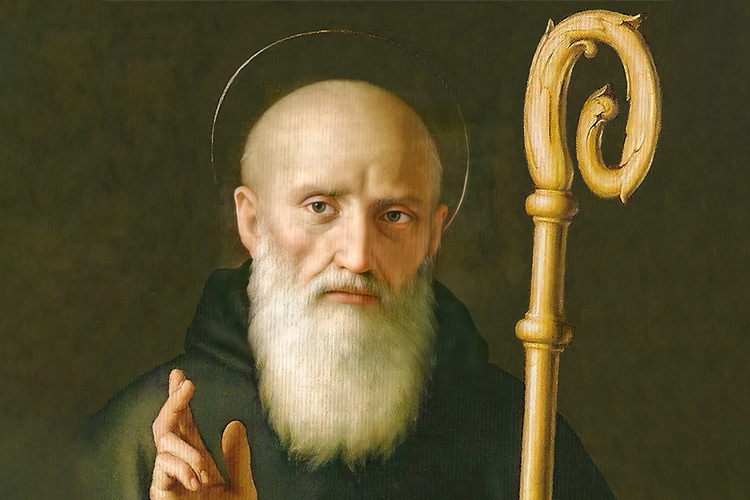
Feast Day: 11 July
One of the most influential men in history
The father of western monasticism, founder of the Benedictines and a Patron Saint of Europe. Saint Benedict was so influential that the early Middle Ages have been called “the Benedictine centuries” in his honour.
Saint Benedict was born in Italy and was the twin of St Scholastica. He studied in Rome, becoming an intelligent scholar, but found that the lifestyle was very corrupt. Benedict became very caught up in the debauchery but it is noted that even at this time he felt unfulfilled by the self-centred life.
After much internal debate, he decided to turn his back on the ambition of becoming a rich Italian noble and moved into the countryside. At this point it seems clear that he wasn’t planning on becoming a hermit.
Encounter with a monk
Things changed when he met a monk, Romanus of Subiaco, while on a journey home one day. They talked deeply about their lives and after St Benedict shared his story, Brother Romanus suggest that he would only find true joy if he spent time seeking God rather than his own pleasure.
Clearly touched by his words, St Benedict followed his advice and became a hermit, spending three years, unknown to men, living in a cave above a lake.
Fighting temptations
One day, the Devil brought before his imagination a beautiful woman he had formerly known, inflaming his heart with strong desire for her. Immediately, St Benedict stripped off his clothes and rolled into a thorn-bush until his body was lacerated. Thus, through the wounds of the body, he cured the wounds of his soul.
In the years that followed, St Benedict matured in both mind and character, in knowledge of himself and of his fellow man. It was during this same period that he began to become well known in the surrounding area and beyond as a wise and spiritual man.
Request at the monastery
Benedict soon received a request from the local monastery that he come and become their new abbot, as their old one had died. At first, St Benedict was very reluctant as there was no set way to run a monastery at this time and discipline was very, very lax.
Eventually, he consented and began trying to formalise a set rule of life that would help the monks mend their ways. The experiment failed, however, and after the monks tried to poison him, St Benedict game up on them and went back to being a hermit.
The Rule of life
Despite this first failure, respect for Saint Benedict continued to grow and more and more people came to him for guidance and to emulate his way of life. Eventually, and not without many hardships along the way, St Benedict set up many monasteries and established a Rule of life that is so wise and effective that it is still being followed to this day and is the basis from which all other religious orders built their own rule of life.
St Benedict died at the age of 63, but his legacy lives on to the present day. The rule of life he created transformed the way monasteries were ran and led to these institutes becoming the bedrock on which society was revolutionised.
From these monasteries, advances in science, medicine, education, mathematics, theology, welfare and much more would be far greater than any previous period in history. It is fair to say that without St Benedict the world would be unrecognisable from what we now know it to be.
Why is Saint Benedict important to me?
St Benedict’s Rule of life was first written to govern the life in monasteries and help those following it live a life of holiness. While monks and nuns are the primary audience and users of this rule, those in the wider Christian world have often chosen to live by the same rule and become what is often known as a Benedictine Oblate.
As someone who does this, I can personally say just how fulfilling it is. The rhythm of prayer and guidelines for day to day activity help you to get the most out of every day and are a constant challenge to better myself.
While as an oblate you live your normal life, you also have a connection to a specific monastery and other oblates in the area which gives you a really strong sense of community. The rule is definitely worth a look and can be bought very cheaply online.